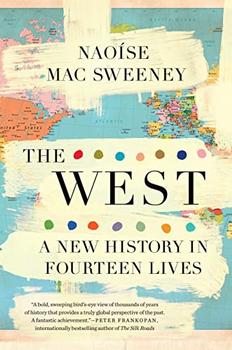Summary | Excerpt | Reviews | Beyond the Book | Readalikes | Genres & Themes | Author Bio

 Book Reviewed by:
Book Reviewed by:
Rose Rankin
Buy This Book
Two troubling thoughts hit me. The first instinctive thought was that I was out of place. I felt that someone like me (female, mixed-race) did not belong in a tradition usually imagined in terms of elite white men. I rapidly dismissed this notion as ridiculous (after all, I was at that very moment sitting in a seat of privilege at a reader's desk), but I was then struck by a much weightier concern. Did these sixteen figures truly represent the past of the West? Was the narrative that linked them an accurate portrayal of Western history?
The standard narrative of Western Civilisation is so omnipresent that most of us rarely stop to think about it, and even less often to question it. Indeed, despite the fact it is being increasingly (and successfully) challenged, this narrative is still all around us. We read about it in school textbooks and works of popular history that, when they set out to explain the history of the West, usually begin it "with the Greeks and the Romans, carry it through the European Middle Ages, focus it on the age of European exploration and conquest, and analyse it closely in the modern world ". The language used of Western Civilisation in such works is usually peppered with genealogical metaphors, describing it in terms of "legacy", "evolution" and "ancestry". We hear time and again that "western civilisation is something we have inherited from the ancient Greeks, the Romans and the Christian Church via the Renaissance, the scientific revolution and the Enlightenment". This idea of Western Civilisation as a linear cultural inheritance is drummed into us from an early age. One influential series of children's books prefaces its magical adventures by describing Western Civilisation as "a living force ... a fire" that first started in Greece; passed from there to Rome; alighted in Germany, France and Spain before resting for several centuries in England; fi nally coming to rest in the United States of America. Origins matter, and where we claim the West came from is one way of characterising what the West fundamentally is.
The West's imagined cultural genealogy is invoked explicitly in the speeches of populist politicians, the rhetoric of journalists and the analysis of pundits. It underlies the symbols and vocabulary deployed by people from across the political spectrum. Amongst these, there is often particular emphasis placed on Greco-Roman antiquity as the birthplace of the West, and allusions to ancient Greece and Rome are frequent in contemporary political rhetoric. When a mob stormed the US Capitol building on 6 January 2021, claiming to defend Western values, they carried flags emblazoned with ancient Greek phrases and placards depicting former President Donald Trump as Julius Caesar, while some wore replicas of ancient Greek helmets, and others even dressed in full Roman military costume. When the European Union launched an initiative to tackle irregular immigration and refugee flows in 2014, it sett led on the name "Operation Mos Maiorum" as a reference to the traditions of ancient Rome. And when Osama bin Laden proclaimed a holy war against the West in 2004, he called on Muslims to "resist the new Rome". But this narrative of Western Civilisation is not just recounted in historical works and invoked in political contexts. It is also all around us, part of the fabric of our everyday lives. We watch it played out in films and on television, coded into the choices of casting directors, costume designers and screen composers. We encounter it enshrined in stone not only at the Library of Congress, but also in the neoclassical architecture of both imperial capitals and colonial buildings around the world. It is so pervasive that most of us simply take it for granted. But is it true?
These were the thoughts that raced through my head that rainy afternoon in Washington, DC. By that point, I had spent the best part of two decades studying precisely these imagined origins of the West, in which is invested so much of Western identity. My particular research focus was on how people in the ancient Greek world understood their own origins, investigating the mythical genealogies they constructed, the ancestor cults where they worshipped, and the stories they told of migrations and foundations. While I felt (and indeed still do feel) privileged to be in my profession, in that moment I was deeply uncomfortable. I realised that I was complicit in upholding an intellectual artifice that was both ideologically and factually dubious – the grand narrative of Western Civilisation. From that point on, I began to repurpose the methods of analysis that I had employed for exploring identities and origins in antiquity, and to apply them to the modern world around me. This book is the result.
Excerpted from The West by Naoíse Mac Sweeney. Copyright © 2023 by Naoíse Mac Sweeney. Excerpted by permission of Dutton. All rights reserved. No part of this excerpt may be reproduced or reprinted without permission in writing from the publisher.





The Funeral Cryer by Wenyan Lu
Debut novelist Wenyan Lu brings us this witty yet profound story about one woman's midlife reawakening in contemporary rural China.
Your guide toexceptional books
BookBrowse seeks out and recommends the best in contemporary fiction and nonfiction—books that not only engage and entertain but also deepen our understanding of ourselves and the world around us.